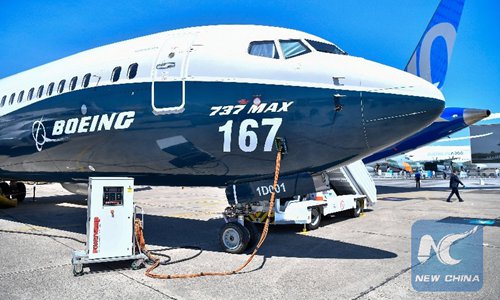Boeing posts loss of 3 bln USD in Q2 from 737 MAX impact
Source:Xinhua Published: 2019/7/25 10:05:59

Photo: Xinhua
US top aircraft manufacturer Boeing Company on Wednesday posted a loss of about 3 billion US dollars in earnings for the second quarter of 2019 as a result of the global grounding of 737 MAX airplanes.
Boeing said its quarterly revenue nosedived by 35 percent to reach 15.8 billion dollars, compared to 24 billion dollars in the same period of last year, as its best-selling 737 MAX jets remained grounded globally since mid-March this year over the two deadly crashes that killed 346 people in Indonesia and Ethiopia.
The company said the second-quarter revenue of 15.8 billion dollars and GAPP loss of 5.21 dollars per share reflected the previously announced 737 MAX charge that cut revenue by 5.6 billion dollars and earnings by 8.74 dollars per share.
Boeing said last week that it would take 4.9 billion dollars in after-tax charge to cover possible compensation to airlines that have canceled thousands of flights of the 737 MAX jets, two of which crashed in Indonesia last October and in Ethiopia in March this year.
Boeing said its Q2 revenue loss was partially helped by better operations earnings from its defense, space, security and service business, which increased 159 percent to hit 975 million dollars, compared to 376 million dollars in the same period a year before.
The company's defense sector generated 6.6 billion dollars in revenues for the quarter, up 8 percent from the figure of 6.1 billion dollars in 2018.
Meanwhile, Boeing's commercial sector yielded only 4.7 billion dollars in revenue for the second quarter, falling sharply by 66 percent from 13.95 billion dollars posted in the corresponding period of last year.
Boeing delivered 90 commercial airplanes for the second quarter, down 54 percent compared to the figure of 194 in the same period of 2018, and the company made no delivery of any 737 MAX planes for this quarter.
Boeing CEO Dennis Muilenburg said on an earnings call Wednesday that the company would consider cutting 737 MAX output to a level below the current rate of 42 aircraft per month, or temporarily suspending its production if the plane's return to service is further delayed.
Boeing announced in April that the monthly production of 737 MAX was reduced from the rate of 52 to 42 airplanes after the second air crash in Ethiopia.
Boeing said that previous 2019 guidance did not reflect the impact of the 737 MAX groundings and new guidance will be issued at a future date due to the uncertainty of the timing and conditions surrounding return to service of the 737 MAX fleet.
The US airplane maker said it is working closely with US federal regulators on the process they have laid out to certify the 737 MAX software update.
"With a clear focus on our values, we're delivering for our customers, working to safely return the 737 MAX to service and capturing new opportunities," Muilenburg tweeted Wednesday.